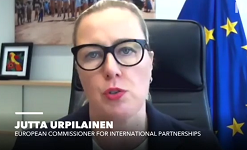BY WOUBISHET SISAY – European Commission (EC) and the International Monetary Fund (IMF) on Tuesday host the African Fiscal Forum and explored ways to strengthen resilience through improvements in social policies and investment in the energy transition in the context of constrained fiscal resources.
The forum is hosted by in Washington, DC. “COVID pandemic, erupted war between Russian invasion of Ukraine and policy tightening in advanced countries that has stopped and reversed capital flows to the region, these shocks have affected growth fiscal revenues the cost of borrowing reducing fiscal space and making debts more difficult to sustain,” said Abebe Aemiro Selssie Director of the African Department of the IMF and Koen Doens Director General INTPA, European Commission.
He also pointed out the objective of the fiscal forum as “to explore ways to strengthen resilience through improvements in social policies and investment in the energy transition in the context of constrained fiscal resources”.
Koen Doens, Koen Doens Director General INTPA, European Commission on his part said that ‘in addition to the stated shocks that the world had been hit that started with pandemic, challenges of structural adjustments or trends we are going through to adapt to the future where we need to combat climate change with digitalization and where we fundamentally have to fight increasing inequality” explaining about how these short term shocks and long term trends are testing the fabrics and the resilience of societies”
Ms. Kristalina Georgieva, Managing Director of the International Monetary Fund, and Ms. Jutta Urpilainen, European Commissioner for International Partnerships, yesterday issued the following statement on the occasion of the Eleventh African Fiscal Forum ‘Building a Resilient Africa’, which is taking place virtually from March 21 to March 22.
“Over the past three years, sub-Saharan African countries have confronted large adverse shocks that have led to a sharp deterioration in living conditions, including the COVID-19 pandemic, food and energy price increases worsened by Russia’s war in Ukraine, and climate change.
“In the face of such shocks, many countries have been compelled to turn to short-term support measures, such as tax cuts, untargeted food or fuel subsidies, and price controls on specific goods. These measures, while necessary, have added to fiscal pressures amid growing debt vulnerabilities, forcing governments into difficult tradeoffs.
“This Forum focuses on three ways to reconcile the need to effectively respond to shocks with the goal to rebuild fiscal space, thereby contributing to building a more resilient Africa:
• When conditions permit, shift from broad-based subsidies to more targeted support to save valuable resources for financing development plans and investment. Social spending provides a solid foundation for inclusive growth. It has a significant impact on human capital development by boosting school enrollment, attendance, and learning, improving health care and outcomes, and laying the foundation for increased economic productivity. Well-designed and targeted social safety nets will ensure that countries’ scarce resources get to the most vulnerable, where they can do the most good.
• Use public money efficiently to maximize its impact and build more resilience for the benefit of the whole economy. Transparent and reliable public financial management (PFM) systems are key, and robust medium-term budgeting frameworks will help policymakers manage competing spending priorities to best achieve their development goals. In addition, digitalization, including in the delivery of social assistance, can play a critical role in improving the efficiency and robustness of the management of public money. And climate-focused PFM and public investment management practices can ensure that countries manage the climate adaptation and transition challenges most effectively within their available resource envelope.
• Secure more stable financial resources and preserve debt sustainability. More concessional financing is needed to relax financing constraints given countries’ high levels of debt and rising borrowing costs. Stronger multilateral cooperation is required to address unsustainable debt situations and provide space to support.
“While such shocks do require governments to step in and protect the most vulnerable, actions to gradually reduce fiscal deficits will be crucial in most countries to rebuild buffers, protect debt sustainability, and ensure macroeconomic stability.
To help unlock financing for climate resilience, sub-Saharan African countries can develop well defined climate strategies that quantify financing needs, promote a good business environment, and develop a pipeline of credible projects. Good governance and fiscal transparency reforms can also foster trust in public institutions, improve tax compliance to support more revenue mobilization, and provide an attractive environment for much needed private financing.
Ms. Kristalina Georgieva Also said “We are committed to working with sub-Saharan African countries to create an attractive policy environment and provide financing to boost investment for sustainable development.”
Participants in the opening roundtable discussion were African ministers and policymakers, bilateral partners and multilateral institutions, and representatives of civil society have.
